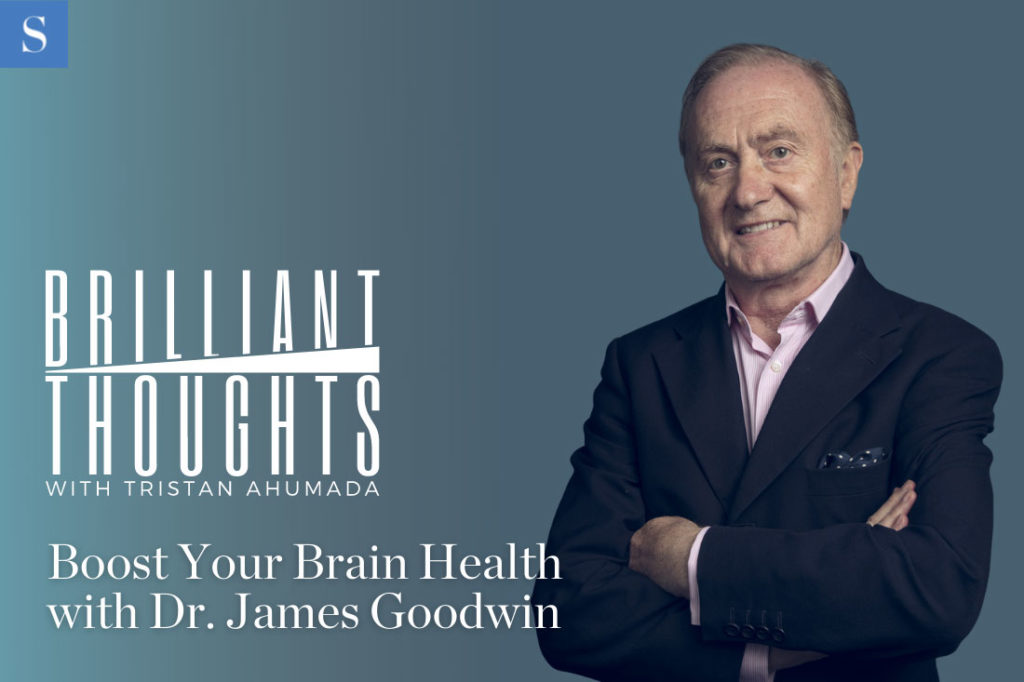Too often, we think about our bodies and brains as completely separate entities that perform unrelated tasks, but this idea couldn’t be more wrong. The brain—like every other organ—is affected by factors including our diet and lifestyle. Despite this reality, most people don’t intentionally engage in activities to improve brain health.
“If I stopped 100 people on the streets of San Antonio and said to them, ‘Tell me three things on how to look after your heart,’ most people could come up with something,” explains Dr. James Goodwin in a recent interview with Brilliant Thoughts’ host Tristan Ahumada. “They’d say lower your cholesterol, slim down your waist, do a bit of exercise, don’t eat pork chops too often, all the rest of it.”
Conversely, Goodwin suggests that if he asked the same people about ways to bolster their brain health, they’d be at a loss. They might suggest doing the occasional crossword puzzle or a similar brain exercise, but would probably be woefully unaware of the things that actually keep the brain in healthy working order.
“This is stuff that everybody should know, and very few people have got access to it,” he says. “So that’s one of the reasons I wrote the book.”
Goodwin’s recent publication is called Supercharge Your Brain: How to Maintain a Healthy Brain Throughout Your Life, and it provides exactly what it promises: a comprehensive plan for sustaining (and even regrowing) your most complex and critical organ.
Your gut plays a huge role in your thinking.
Scientists are a long way from uncovering all of the human brain’s underlying mechanisms and capabilities, and it’s not hard to understand why. With approximately 86 billion cells and another 86 billion support cells, each person’s brain has enough cellular connections to stretch to the moon and back. Something that scientists do understand, however, is the powerful connection between gut health and brain function.
“Inside the dark, cavernous recesses of that gurgling mess in our large intestine… there’s a huge pharmaceutical factory that is producing the best medicine we ever had,” Goodwin explains. “It’s talking to the brain through a vast nerve called the vagus nerve that wanders from the gut up to the brain, and 90% of the messages are going up to the brain from the gut.”
To illustrate this idea, he uses the example of serotonin, which is often called “the happy hormone.” Because serotonin is so critical to cell communication and well-being, you’d think it would be made by the brain, but 90% of the body’s serotonin is made in the bowels. So if you suffer from a lack of serotonin, there’s a good chance it has more to do with your gut health than your brain.
“If you stress out the bugs in your bowel, you’re gonna mess with the brain,” says Goodwin about gut microbes. “The research is absolutely straightforward on this: Those bugs down there control how you feel, your emotions and your mood, control your behavior and also control the way you think.”
The bugs Goodwin is referring to are microbes, microscopic organisms like bacteria. Everyone has them; babies inherit them when passing through the mother’s birth canal, from breastmilk or by putting germy fingers in their mouths. However, these “bugs” aren’t a bad thing—their presence is absolutely essential to good health. The best way to keep the gut flora happy, according to Goodwin, is by eating a diverse diet with a wide array of whole foods.
Daily exercise can reverse cognitive decline.
A lot of brain health comes down to lifestyle: your diet, exercise routines, amount of sleep and social life. As a result, people living fast-paced, stressful or lonely lives are at a higher risk for cognitive decline.
“Our western way of life just does us no favors—it’s almost like some ghastly experiment of sleeplessness, poor diets, low levels of activity and lots of stress,” says Goodwin. “Incrementally, day by day, this has an influence on how fast we age, which can be slowed down and can even be reversed.”
According to Goodwin, most brains lose between 1-2% of mass each year. Depending on your lifestyle, you may lose more, less or none. By implementing certain daily exercises into your routine, you may actually gain a couple percent back.
“When you’re exercising, you’re not only looking after your body and building muscle and staying fit, but you’re also building the brain,” he says. “We know that this process goes on every decade of our life and doesn’t end as you get older—it’s there right until your 90s.”
Inflammation is the root of all aging.
The body’s chemistry can do a huge amount to counteract cognitive decline or to accelerate it. Stress is particularly hard on the body because it produces hormones that cause inflammation, which, according to Goodwin, is the root of all aging. Although the immune system gets worse at regulating inflammation with age, there are easy ways to minimize it.
“The message for listeners is to lead a low inflammation lifestyle, and it’s not difficult, there’s lots of things you can do which are pleasurable and reduce inflammation in the body,” he says. “More sex is one, better sleep is another.”
That’s right—taking time to lounge and have more sex can actually reduce your risk for cognitive decline. But stress and inflammation aren’t the only factors to consider; loneliness poses huge risks to health as well. Human interaction is essential to optimal brain functioning, which is why isolation can have such disastrous mental health ramifications. It’s important to maintain social interactions, even if they take place remotely.
The future is bright—don’t lose faith in science.
“It wouldn’t surprise me if in the next 10 to 20 years, we understand fully how to slow down aging to almost zero,” says Goodwin optimistically. “I don’t believe you’ll stop it completely, but some do… I put the ceiling on most people getting older to about 120 years of age.”
To Goodwin, the magic of science is that it can be proven wrong, updated and changed. Unlike a religious ideology, science is not a static body of facts, but rather a living, breathing legacy. He tells Ahumada that he realizes the pandemic has left many people divided on the role science should play in our society, but implores listeners to keep the faith.
“I was at a conference once in Salzburg in Austria where Bruno Vellas was the one of the speakers, and he stood up and said, ‘We have a precious resource, because science is the key to the future health of humanity,’ and that is absolutely true,” he concludes. “It’s what the politicians do with science that wrecks it.”
Interested in learning more about brain health and aging? Visit Goodwin’s website to access his research, health blog, upcoming speaking engagements and more.
Brilliant Thoughts with Tristan Ahumada is no longer releasing new episodes on the SUCCESS Podcast Network, but you can still listen to the full conversation below.





